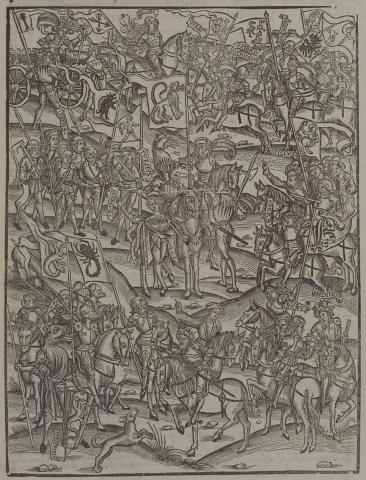CORE VOCABULARY
nec or neque: (adv. and conj.), and not; neither, nor, 1.643, et al.; in prohibition, 3.394, et al.; neque (nec) — neque (nec), neither — nor, 5.21, et al.; nec — et, or -que, may be rendered neither — nor, 12.801; 2.534; nec nōn, and also, nor less, 6.183; nec nōn et, and also, 1.707.
Praenestīnus, a, um: adj. (Praeneste), of Praeneste, 7.678.
fundātor, ōris, m.: a founder, 7.678. (1. fundō)
dēsum, fuī, esse, irreg. n.: to be absent, 7.678; to be wanting or missing, 2.744; fail, be wanting, lacking, 10.378. (deest, deeram, deero, etc., often pronounced and sometimes spelled dest, etc.)
Vulcānus, ī, m.: the god of fire and of the forge, son of Jupiter and Juno, 8.422; (meton.), fire, 2.311, et al.
agrestis, e: adj. (ager), pertaining to the fields or country; country-, rustic, rural, 3.34; wild, 7.111; subst., agrestis, is, m., a rustic, 7.504; husbandman.
focus, ī, m.: a fireplace, hearth, 5.660; home, 3.134; place where the funeral pyre has been consumed, place of burning, 11.212; fire, firebrand, 12.285.
Caeculus, ī, m.: son of Vulcan, and mythical founder of Praeneste, 7.681.
lātē: (adv.), widely; far and wide, 1.21; on all sides, far around, 1.163; all over, 12.308. (lātus)
comitor, ātus sum, 1. dep. a.: to accompany, attend, follow, 3.660; p., comitātus, a, um, attended, accompanied, 1.312, et al. (comes)
Praeneste, is, n. and f.: a town in Latium on a lofty hill about twenty miles southeast of Rome; now Palestrina, 7.682.
Gabīnus, a, um: adj. (Gabiī), of Gabii, Gabinian, 7.612.
Iūnō, ōnis, f.: Juno, the Sabine and Roman name for the wife and sister of Jupiter, daughter of Saturn, 1.4, et al.; Iūnō īnferna, the Juno of the lower world, Proserpine, 6.138.
gelidus, a, um: adj. (gelū), frosty, ice-cold; cold, cool, icy, chilling, 2.120; chilled, 3.30.
Aniō (Anien), ēnis or ōnis, m.: the Anio, a branch of the Tiber, flowing from the Sabine Mountains through Latium, 7.683.
rōscidus, a, um: adj. (rōs), covered with dew; dewy, 4.700; wet, 7.683.
rīvus, ī, m.: a small stream; a rill, brook, rivulet, stream, 3.350.
Hernicus, a, um: adj. (Hernicī), of the Hernici, an Italian tribe of Latium; Hernican, 7.684.
Anagnia, ae, f.: Anagnia, a town of the Hernici, 7.684.
pāscō, pāvī, pāstus, 3, a. and n.: to furnish with food; to feed; rear, breed, 6.655; nourish, 1.608; (fig.), 1.464; let grow, 7.391; cherish, indulge, nourish, 10.627; pass. as dep., pāscor, pāstus sum, 3, a. and n., to graze, 1.186; feed upon, eat, 2.471; use for pasture, to pasture, 11.319.
Amasēnus, ī, m.: the Amasenus, a river of Latium, 11.547; the river-god Amasenus, 7.685.
clipeus, ī, m., and clipeum, ī, n.: a round shield; a shield, 2.227, et al.
glāns, glandis, f.: an acorn; a leaden ball or bullet, 7.686.
līveō, 2, n.: to be bluish, pallid, livid, 7.687.
plumbum, ī, n.: lead, 5.405; a leaden bullet, 9.588.
spargō, sparsī, sparsus, 3, a.: to scatter, strew; cast in fragments, 3.605; disperse, 1.602; shower, hurl, 12.51; sprinkle, 4.512; besprinkle, bedew, stain, 8.645; infuse, 4.486; (fig.), spread abroad, disseminate, 2.98; bring over or upon, diffuse, 7.754.
spīculum, ī, n.: a sharp point; (meton.), an arrow, a dart, javelin, spear, 5.307.
gestō, āvī, ātus, 1, a. and n.: to carry habitually; bear, 1.336; have, 1.567. (gerō)
bīnī, ae, a: (adj. num. distrib.), two by two; two to each, 5.61; (poet. as cardinal), two, 1.313, et al. (bis)
manus, ūs, f.: the hand, 1.487; freq.; (meton.), action, movement of the hand; work, art, handiwork, 3.486; prowess, heroic deed, action, 2.434; force, violence, 2.645; a collection of persons; a band, crew, troop; an army, 2.29; forces, 5.623; multitude, 6.660; pl., manūs, workmen, 11.329; dare manūs, to yield, 11.558; extrēma manus, the finishing hand or touch, 7.572.
fulvus, a, um: (adj.), reddish or tawny yellow; yellow, 5.374; tawny, 2.722; brown, 11.751; glowing, bright, 12.792.
lupus, ī, m.: a wolf, 3.428, et al.
pellis, is, f.: a skin, hide, 2.722, et al.
galērus, ī, m.: a cap of fur or undressed skin; hat, cap, 7.688. (rel. to galea)
tegmen (tegumen), inis, n.: a means of covering; skin, hide, 1.275; clothing, 3.594; shield, 9.577; tegmen crūrum, close-fitting trousers worn by Phrygians, 11.777. (tegō)
sinister, tra, trum: (adj.), left, 7.689; on the left side or left hand, 6.548; (fig.), wrong-headed, perverse, 11.347; adverse, inauspicious, unlucky, ill-boding.
īnstituō, uī, ūtus, 3, a.: to fix in a place; put down, plant, step with, 7.690; found, inaugurate, 6.70; w. inf., ordain, 6.143; prepare, begin, 7.109; teach. (1. in and statuō)
crūdus, a, um: (adj.), bloody, raw; of untanned hide, of raw hide, 5.69; covered with blood, bloody, 12.507; fresh, strong, vigorous, 6.304; rough, green, 9.743; deadly, cruel, fatal, 10.682.
pērō, ōnis, m.: a boot or high shoe made of rawhide, 7.690.

